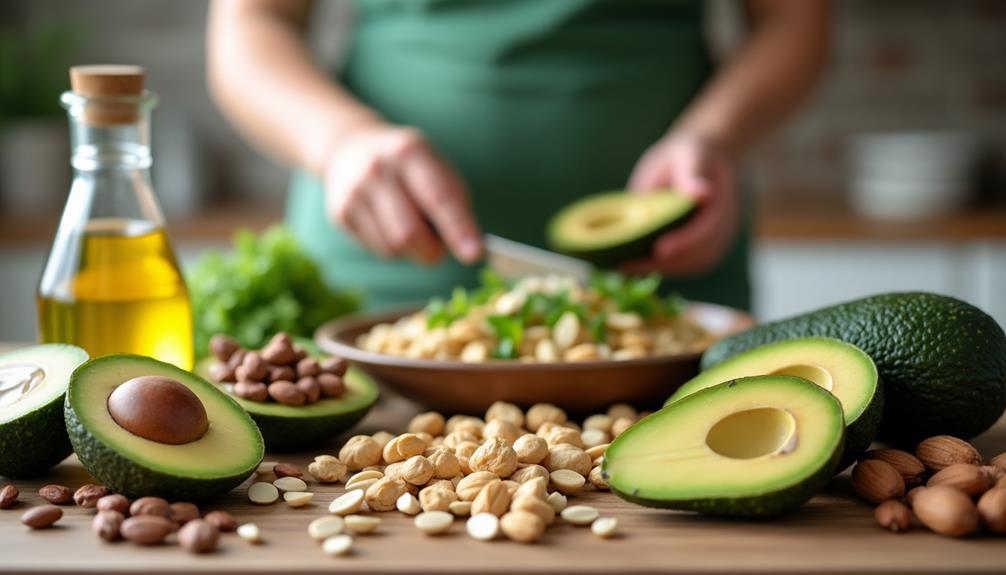To enhance your recovery, focus on these seven tips to improve nutrient intake. First, prioritize protein sources like lean meats, eggs, and plant-based options for muscle repair. Next, incorporate healthy fats from avocados, nuts, and fatty fish for anti-inflammatory benefits. Choose whole grains such as brown rice and quinoa to provide sustained energy. Don't forget to stay hydrated; aim to drink water throughout the day. Fill your plate with colorful fruits and vegetables for essential nutrients and antioxidants. Finally, consider the timing of meals and use supplements wisely to support your recovery. There's much more to explore on this topic.
Core Insights
- Prioritize protein sources like lean meats, fish, eggs, and plant-based options to support muscle recovery and hormone balance.
- Incorporate healthy fats from avocados, nuts, seeds, and fatty fish to reduce inflammation and boost energy levels.
- Choose whole grains such as quinoa and brown rice for complex carbohydrates, fiber, and essential nutrients that aid recovery.
- Stay hydrated by drinking water consistently and using electrolyte-rich beverages after intense workouts to replenish lost fluids.
- Fill half your plate with colorful fruits and vegetables to ensure a diverse intake of antioxidants and essential nutrients for faster recovery.
Prioritize Protein Sources

When it comes to recovery, you can't overlook the significance of protein sources. Protein plays an ideal role in repairing muscles and promoting recovery after physical activity. To prioritize protein in your diet, aim for a variety of sources. Lean meats, poultry, fish, eggs, dairy products, and plant-based options like beans, lentils, and tofu are all excellent choices. Consuming adequate protein is also essential for maintaining testosterone levels, which can impact overall recovery and performance. Some protein sources, such as eggs and lean meats, are particularly beneficial for hormone balance.
Incorporating protein into your meals and snacks is essential. Try adding Greek yogurt with fruit for breakfast or a protein shake post-workout. Aim for around 20-30 grams of protein within two hours after exercise to maximize recovery. Remember, balance is key; combine protein with carbohydrates for best results. By focusing on your protein intake, you'll support your body's recovery and overall performance.
Incorporate Healthy Fats

Consider including these nutritious fats in your diet:
Enhancing muscle gain through healthy fat intake can greatly enhance recovery and overall performance. Including a variety of nutrient-rich fats is crucial to achieving excellent results.
- Avocados: Abundant in monounsaturated fats and potassium.
- Nuts and seeds: Supplying omega-3 fatty acids and protein.
- Olive oil: An excellent source of antioxidants and healthy fats.
- Fatty fish: Like salmon, which is rich in omega-3s.
- Coconut oil: Recognized for its medium-chain triglycerides beneficial for energy.
Choose Whole Grains

Healthy fats play a significant role in your recovery, but they're just one piece of the puzzle. Choosing whole grains is necessary for ideal nutrient intake. Whole grains, like brown rice, quinoa, and whole-wheat bread, provide complex carbohydrates that fuel your body. They're packed with fiber, which helps stabilize blood sugar levels and keeps you feeling full longer. While whole grains are essential, some athletes also incorporate beetroot powder supplements to boost endurance and recovery. These supplements can complement a whole grain-rich diet for enhanced performance.
When you opt for whole grains, you're also getting essential nutrients such as B vitamins, iron, and magnesium. These nutrients support energy production and muscle function, important for recovery.
To incorporate whole grains into your meals, try swapping refined grains for whole options. Start with breakfast by choosing oatmeal or whole-grain toast. Your body will thank you for the extra nutrients.
Stay Hydrated

Your body's hydration level greatly impacts recovery, making it essential to prioritize fluid intake. Staying hydrated helps transport nutrients to your muscles, aids digestion, and regulates body temperature. Without adequate hydration, you may experience fatigue, muscle cramps, and delayed recovery.
Here are some tips to help you stay hydrated:
- Drink water consistently throughout the day, not just during workouts.
- Monitor your urine color; light yellow indicates good hydration.
- Incorporate electrolyte-rich beverages after intense exercise to replenish lost minerals.
- Set reminders to drink water if you often forget.
- Carry a reusable water bottle with you to encourage regular sipping.
Include Fruits and Vegetables

Aim to fill half your plate with colorful options. Leafy greens, like spinach and kale, provide essential nutrients that combat inflammation. Berries, rich in antioxidants, can help reduce muscle soreness after intense workouts.
Don't forget to mix it up. Different colors usually mean diverse nutrients. Experiment with smoothies, salads, or stir-fries to keep things interesting. By prioritizing fruits and vegetables, you're setting yourself up for a quicker recovery and improved overall health.
Consider Timing Your Meals

- Post-workout nutrition: Aim to eat within 30-60 minutes after exercising.
- Frequent meals: Consider smaller meals throughout the day to maintain energy levels.
- Balanced macronutrients: Include carbohydrates, proteins, and fats in each meal for peak recovery.
- Hydration: Don't forget to drink water before, during, and after meals.
- Listen to your body: Pay attention to hunger cues to time your meals effectively.
Use Supplements Wisely

Next, seek advice from a healthcare professional or a registered dietitian before incorporating any supplements into your routine. They can provide guidance on dosages and potential interactions with other nutrients.
Additionally, keep in mind that supplements should not be a substitute for whole foods. Strive to obtain the majority of your nutrients from a well-rounded diet. Finally, track your progress and make any necessary adjustments to your supplement regimen to maintain its effectiveness for your recovery objectives.
Frequently Asked Questions
How Do Nutrient Needs Change With Different Activity Levels?
Your nutrient needs shift based on activity levels. When you're more active, you require extra carbohydrates for energy and protein for muscle repair. Conversely, less activity means your body needs fewer calories and nutrients overall.
Can I Meet My Nutrient Needs Through Diet Alone?
Yes, you can meet your nutrient needs through diet alone. Focus on a balanced intake of fruits, vegetables, whole grains, and proteins. Planning meals thoughtfully is crucial to make sure you're getting everything your body requires.
What Are the Signs of Nutrient Deficiencies?
Did you know nearly 90% of people don't get enough vitamins and minerals? Signs of nutrient deficiencies include fatigue, hair loss, brittle nails, and frequent infections. Pay attention to your body's signals for better health.
Are There Specific Foods to Avoid During Recovery?
During recovery, you should avoid processed foods high in sugar and unhealthy fats. These can hinder your healing process, cause inflammation, and reduce energy levels. Focus on whole, nutrient-dense foods instead for better results.
How Can Meal Prep Help With Nutrient Intake?
If you think meal prep's just for Instagram influencers, think again! By planning meals, you guarantee you've got nutritious options ready, saving time and avoiding those late-night junk food cravings that sabotage your efforts.

